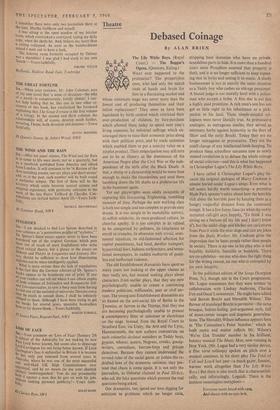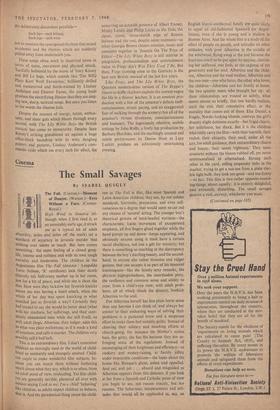Theatre
Debased Coinage
By ALAN BRIEN The Lily White Boys. (Royal
Court.) — The Beggar's Opera. (Questors, Ealing.) WHAT ever happened to the proletariat? The propertyless ones, who had only the naked tools of hands and brain for hire in a fluctuating market and whose minimum wage was never more than the lowest cost of producing themselves and their infant replacement? They seem to have been liquidated by birth control which restricted their over-production of children, by hire-purchase which allowed them today to spend next year's living expenses, by universal suffrage which en- couraged them to raise their economic price along with their political price, and by trade unionism which enabled them to put a scarcity value on a surplus product. Their emancipation may still turn out to be as illusory as the dominance of the American Negro after the Civil War or the inde- pendence of the serfs after the Black Death. A war, a slump or a dictatorship would be more than enough to shake the foundations and send them tumbling down the lift shafts to a proletarian life in the basement again.
Yet our playwrights seem oddly incapable of capturing this fascinating, frightening, trembling moment of time. Perhaps the neW working class is both too simple and too complex to provide easy drama. It is too simple in its monolithic naivety, its selfish solidarity, its mass-produced culture, its cheerful apathy. It is too complex in its refusal to be categorised by pollsters, its reluctance to enroll in crusades, its obsession with trivial, senti- mental injustices, its old-fashioned affection for capital punishment, bad food, derelict transport, hypocritical laws, hideous architecture, and sensa- tional newspapers, its sudden outbursts of point- less and ineffectual violence.
The old Establishment dramatists have spent so many years not looking at the upper classes as they really are, but instead making plays about characters from earlier plays, that they are now psychologically unable to create a convincing modern politician, millionaire, peer or civil ser- vant. The young anti-Establishment dramatists are so fixated on the anti-social life of Berlin in the Twenties, or Jarrow in the Thirties, that they too are becoming psychologically unable to present a contemporary fitter or salesman or electrician on the stage. Instead, from the Royal Court to Stratford East, via Unity, the Arts and the Lyric, Hammersmith, the new authors concentrate on such colourful declasse outsiders as Teddy boys, gypsies, whores, queers, Negroes, crooks, gossip- writers, comedians, barrow-boys and private detectives. Because they cannot understand the revised rules of the social game, or isolate the re- drafted laws of the economic universe, they pre- tend that chaos is come again. It is not only the journalists, as Osborne claimed in Paul Slickey, who ask the fake questions which prevent the real questions being asked.
Our dramatists, too, spend our time digging for solutions to problems which no longer exist, stripping bare dummies who have no private, scandalous parts to hide. It is more than a hundred years since Proudhon asserted that property is theft, and it is no longer sufficient to keep repeat- ing that in lyrics and setting it to music. A shady businessman is not in exactly the same situation as a Teddy boy who coshes an old-age pensioner. A biased judge is not morally level with a police- man who accepts a bribe. A film star is not just a highly paid prostitute. A rich man's son has not got as little right to his inheritance as a pick- pocket to his haul. These simple-minded syl- logisms were never literally true. As provocative analogies, as outrageous similes, they served as necessary barbs against hypocrisy in the days of Shaw and the early Brecht. Today they are no longer outrageous or provocative. They are the small change of any intellectual book-keeping. To produce these schoolboy sarcasms now as newly minted revelations is to debase the whole coinage of social criticism—and this is what has happened in Christopher Logue's The Lily White Boys.
I have called it Christopher Logue's play be- cause the original dialogue of Harry Cookson is almost buried under Logue's songs. Even what is left seems hardly worth unearthing—a primitive Hyde Park spouter's satire about how the horrible rich abuse the horrible poor by keeping them at a hungry respectful distance from the communal trough. It has a few funny lines (as when the newly recruited call-girl says happily, 'To think I was sitting on a fortune all my life and I didn't know it'), but the under-dogs and bitches are caricatures from Punch while the over-dogs and cats are jokes from the Daily Worker. Mr. Cookson gives the impression that he hates people rather than people in society. There is no one in his play who is not buyable, biddable, beatable or beddable. There are no subtleties—no one who does the right thing for the wrong reason, no one who is corrupted by his own integrity.
In the published edition of the Songs (Scorpion Press, 5s.), though not in the Court programme, Mr. Logue announces that they were written 'in collaboration with Lindsay Anderson, Charles Fox and Oscar Loewenstein.' He might have added 'and Bertolt Brecht and Meredith Wilson.' The flavour of translated Brecht is pervasive—the same brusque, button-holing, pub-argument style, full of Street-corner images and dogmatic generalisa tions. The Meredith Wilson influence appears here in The Committee's Point Number,' which in both metre and matter reflects Mr. Wilson's 'We've Got Trouble' number in his brilliant, bouncy musical The Music Man, now running in New York. (Mr. Logue had a very similar device, a free verse soliloquy spoken on pitch over a musical continuo, in his short play The Trial of Cob and Leach last year—a much gayer, funnier, warmer work altogether than The Lily White Boys.) But there is also much that is characteristi- cally, and infuriatingly, Loguish. There is the insistent meaningless metaphors— Everyone wants bread with eyes, And cheese with no eyes in it. the deliberately discordant parallels— Such lips—such lettuce, Such legs—such wine not to mention the syncopated rhythms that sound accidental and the rhymes which are suddenly pulled away from underneath you.
These songs often work in theatrical terms in terms of noise, movement and physical attack. Tactfully bolstered by the music of Tony Kinsey and Bill Le Sage, which sounds like 'The MJQ Plays Kurt Weill Favourites,' brilliantly drilled and manceuvred and battle-trained by Lindsay Anderson and Eleanor Fazan, the young leads produce the electrifying illusion that they are sing- ing new, sharp, satirical songs. But once you listen to the words the illusion fails.
Despite the amount of energy, talent, enthus- iasm, and sheer guts which blazes through every second, with The Lily White Boys the British musical has conic to immaturity. Despite Sean Kenny's striking grandstand set against a huge office-block backdrop with its witty dangling Posters and pictures, Lindsay Anderson's com- mando raids which use every inch for effect, the unnerving un-actorish presence of Albert Finney, Monty Landis and Philip Locke as the Teds, the clever, comic, revue-sketch edge of Ronnie Stevens and the rest, despite some moments—as when Georgia Brown chimes emotion, music and comment together in 'Jeannie On The Price of Ethics'—The Lily White Boys is still inferior in integration, professionalism and entertainment value to Fings Ain't Wot They Used T'Be. But then, Fings (coming soon to the Garrick) is the best new British musical of the last five years.
Like Fings, and The Lily White Boys, the Questors modern-dress version of The Beggar's Opera to skiffle rhythms exploits the current vogue for life in a thieves' kitchen. It is an amateur pro- duction with a few of the amateur's defects (self- consciousness, erratic pacing, and an exaggerated fear of walking through the scenery) but all of the amateur's virtues (freshness, conscientiousness and humour). The ingeniously effective, mobile settings by John Rolfe, a lively hip production by Barbara Hutchins, and the startlingly assured and subtle performance by Denise Huot as Lucy Lockitt produce an infectiously entertaining evening.











































 Previous page
Previous page